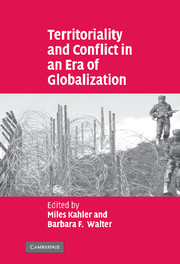Book contents
- Frontmatter
- Contents
- List of figures
- List of tables
- List of contributors
- Acknowledgments
- 1 Territoriality and conflict in an era of globalization
- Part I Territorial attachment and detachment
- Part II Territorial stakes and violent conflict
- 6 Territory and war: state size and patterns of interstate conflict
- 7 Globalization, economic development, and territorial conflict
- 8 The death of distance? The globalization of armed conflict
- Part III Territorial regimes in an era of globalization
- Conclusion
- References
- Index
7 - Globalization, economic development, and territorial conflict
Published online by Cambridge University Press: 22 September 2009
- Frontmatter
- Contents
- List of figures
- List of tables
- List of contributors
- Acknowledgments
- 1 Territoriality and conflict in an era of globalization
- Part I Territorial attachment and detachment
- Part II Territorial stakes and violent conflict
- 6 Territory and war: state size and patterns of interstate conflict
- 7 Globalization, economic development, and territorial conflict
- 8 The death of distance? The globalization of armed conflict
- Part III Territorial regimes in an era of globalization
- Conclusion
- References
- Index
Summary
Introduction
In a world of finite resources, states occasionally use or threaten force to coerce what they cannot obtain more expediently through bargain or barter. Historically, territory has been a particularly potent source of interstate friction (Vasquez 1993). Land, and the resources in and under territory, traditionally served as the basis for sovereign wealth and power. Big states were naturally stronger, and often attempted to co-opt their smaller neighbors (Fazal 2002; Alesina and Spolaore 2005; Lake and O'Mahony 2004). Warfare ensued as sovereigns sought to take or hold territory, or to acquire or retain resources and populations tied to the soil. A variety of arguments and anecdotes suggest ways in which the incentives to compete over territory have diminished among advanced industrialized economies. Two main forces characterize economic changes thought to be associated with a decline in the propensity toward territorial conflict: economic development and globalization. Economic development involves specialization of labor, technological innovation, the concentration of capital, and other measures that substantially increase productivity beyond levels in traditional societies. Globalization consists of the integration of markets and the decentralization of production networks.
Students of international politics have long been interested in the role of economic development in curbing, or augmenting, the impetus to take up arms. Still, how economic processes relate to interstate conflict is as yet poorly understood. Elsewhere, I point out that contrasting claims about economic development and conflict can be reconciled by recognizing that development differentially affects competition over different “goods.”
- Type
- Chapter
- Information
- Territoriality and Conflict in an Era of Globalization , pp. 156 - 186Publisher: Cambridge University PressPrint publication year: 2006
- 15
- Cited by



